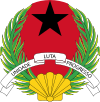Related Research Articles

Guinea-Bissau, officially the Republic of Guinea-Bissau, is a country in West Africa that covers 36,125 square kilometres (13,948 sq mi) with an estimated population of 1,874,303. It borders Senegal to the north and Guinea to the south-east.
Guinea-Bissau was dominated by Portugal from the 1450s to the 1970s; since independence, the country has been primarily controlled by a single-party system.

Bissau is the capital city of Guinea-Bissau. In 2015, Bissau had a population of 492,004. Bissau is located on the Geba River estuary, off the Atlantic Ocean, and is Guinea-Bissau's largest city, major port, and its administrative and military centre.
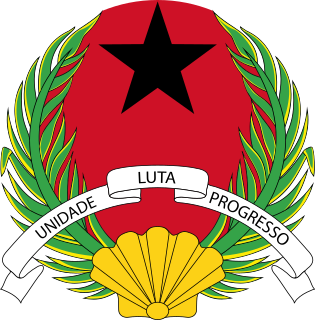
The Republic of Guinea-Bissau follows a nonaligned foreign policy and seeks friendly and cooperative relations with a wide variety of states and organizations. France, Portugal, Angola, Brazil, Egypt, Nigeria, Libya, Cuba, the Palestine Liberation Organization, and Russia have diplomatic offices in Bissau.
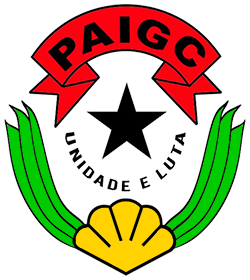
The African Party for the Independence of Guinea and Cape Verde is a political party in Guinea-Bissau. Originally formed to peacefully campaign for independence from Portugal, the party turned to armed conflict in the 1960s and was one of the belligerents in the Guinea-Bissau War of Independence. Towards the end of the war, the party established a socialist one-party state, which remained intact until multi-party democracy was introduced in the early 1990s. Although the party won the first multi-party elections in 1994, it was removed from power in the 1999–2000 elections. However, it returned to office after winning parliamentary elections in 2004 and presidential elections in 2005, since which it has remained the largest party in the National People's Assembly.
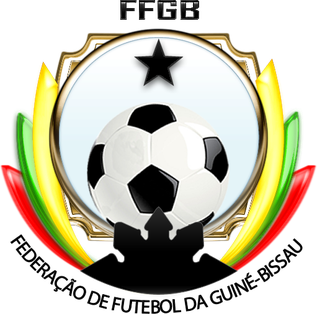
The Guinea-Bissau national football team represents Guinea-Bissau in men's international association football and it is controlled by the Football Federation of Guinea-Bissau, The team has never qualified for the FIFA World Cups but qualified for the Africa Cup of Nations three times, making their debut in 2017. The team is a member of both FIFA and Confederation of African Football (CAF).
The individual member states of the African Union (AU) coordinate foreign policy through this agency, in addition to conducting their own international relations on a state-by-state basis. The AU represents the interests of African peoples at large in intergovernmental organizations (IGO's); for instance, it is a permanent observer at the United Nations' General Assembly.

The Guinean forest-savanna mosaic is an ecoregion of West Africa, a band of interlaced forest, savanna, and grassland running east to west and dividing the tropical moist forests near the coast from the West Sudanian savanna of the interior.

The Football Federation of Guinea-Bissau is the governing body of football in Guinea-Bissau. It was founded in 1974, and affiliated to FIFA and to CAF in 1986. It organizes the national football league and the national team.

Guinea-Bissau–United States relations are bilateral relations between Guinea-Bissau and the United States.

The following outline is provided as an overview of and topical guide to Guinea-Bissau:

There are diverse religions in Guinea-Bissau with no one religion having a majority. The CIA World Factbook states there are about 45% Muslims, 22% Christians, 15% Animists and 18% unspecified or other while the US State Department mentions that estimates vary greatly and cites the Pew Forum data (2010) of 40% Muslim, 31% indigenous religious practices, and 20% Christian. Sunni Islam, including that of Sufi-oriented, are most concentrated in the northern and northeastern parts of the country. Practitioners of traditional indigenous religious beliefs generally live in all but the northern parts of the country. Christians are mostly found along the coastal regions, and belong to the Roman Catholic Church and various Protestant denominations. Christians are concentrated in Bissau and other large towns.

Guinea-Bissau–Russia relations is the bilateral foreign relations between the two countries, Guinea-Bissau and Russia.

Republic of Guinea-Bissau passports are issued to citizens of Guinea-Bissau to travel outside the country. Guinea-Bissau citizens can travel to member states of the Economic Community of West African States (ECOWAS) without a passport.
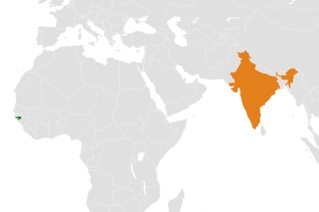
Guinea-Bissau–India relations refers to the international relations that exist between Guinea-Bissau and India. The embassy of India in Dakar, Senegal is concurrently accredited to Guinea-Bissau. India opened an Honorary Consulate in Bissau on 28 May 2010. Guinea-Bissau has no diplomatic mission in India.
Mass media in Guinea-Bissau includes print, radio, television, and the Internet. "The Conselho Nacional de Comunicação Social regulates the press." The government-run Guinea-Bissau National Radio began in 1973 and Guinea-Bissau Television began in 1987.
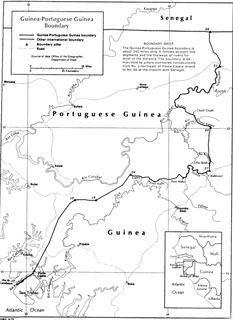
The Guinea–Guinea-Bissau border is 421 km in length and runs from the Atlantic Ocean in the south-west to the tripoint with Senegal in the north-east.
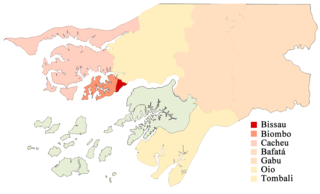
The COVID-19 pandemic in Guinea-Bissau is part of the worldwide pandemic of coronavirus disease 2019 caused by severe acute respiratory syndrome coronavirus 2. The virus was confirmed to have reached Guinea-Bissau in March 2020.
References
- ↑ "Lakes, rivers, ponds in Guinea Bissau GNB GW". Mainfacts.com. Retrieved 2017-04-06.CS1 maint: discouraged parameter (link)
